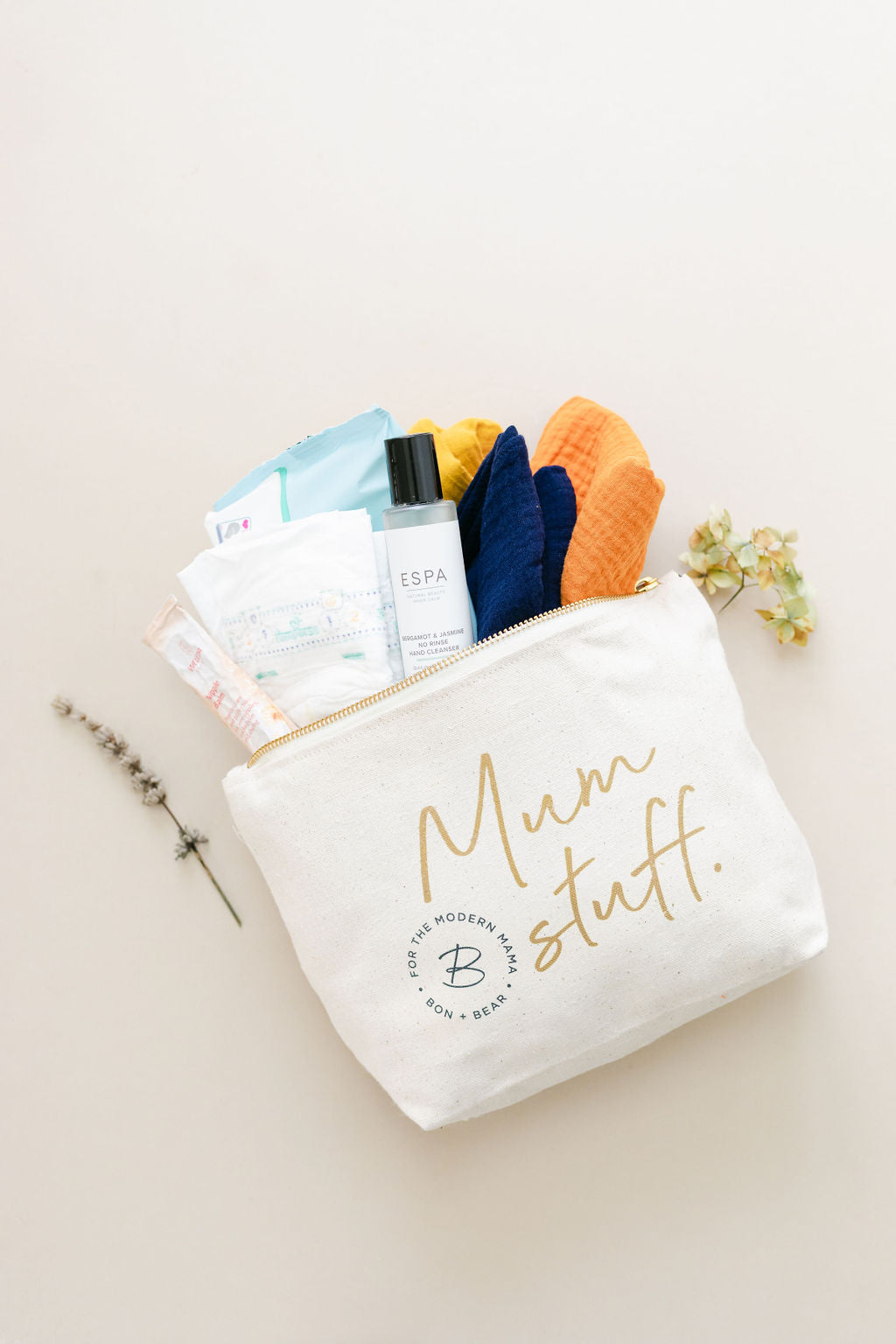
5 Breastfeeding Tips For New Mums
At Bon + Bear it's no secret that we want to support every new mama on their journey, especially when it comes to achieving their breastfeeding goals. We know only too well from our own experiences and other mothers in our community that most of them felt let down by the lack of support they received either with access to healthcare services for breastfeeding issues or from family and friends who too quickly quip 'can't you just give them formula?'.
There is no judgment here, we are all about feeding your way whether it's fully breastfeeding, combined feeding or bottle feeding as long as it is on your terms.
We can't help solve all the issues that might come your way as every mum's feeding journey is different and we always suggest seeking guided IBCLC Lactation Support, but we can at least give you our top tips to help in those initial weeks which will apply to nearly all new mums.
-
Hydrate Often
Keep a drink nearby at all times, it’s thirsty work and crucial to drink at least 2L of water a day (that is a typical adult recommendation), there’s no need to drink to excess but if you’re thirsty then it’s your cue you need to drink more. Having a straw lid/bottle makes it easy to reach for a drink with only one hand as we all know your other arm will be cradling baby whilst they breastfeed.
It is normal for feeds to take anywhere from 10-50 minutes each time and that can be at least 8+ times a day in those first few weeks. Don't worry that the baby isn't getting enough milk or your milk supply is low because of this, it is rarer than you think to have this and the only way you can be sure is nappy output and weight gain.
Set up a feeding station with everything you will need to be comfortable: Magazines, Drinks, Healthy Snacks, Breastpads, Muslins, Nipple Balm, Breastfeeding Pillow, TV Remote, and Headphones.
-
Feed Regularly
Too many parenting books say 'get baby into a routine' and even advise feeding every 3-4 hours, but this is not recommended at all in the first 6-8 weeks. You need to bring baby to the breast as often as you can – even if you think 'how can they be hungry again' – until they are gaining weight consistently and are producing at least 6+ heavy, wet nappies a day.
Don't worry about a routine or schedule yet, typically this isn't needed until at least 3-4 months old when they are out of the 'fourth trimester', as they are still very much in womb mode and want constant body contact and nourishment. It is normal that they want to feed all the time and do not want to be put down.

-
Avoid Dummies + Supplementing Feeds
A dummy is a substitute for a nipple/breast, hence why it is shaped that way. So instead of reaching for a dummy, do what is natural and intended, bring them to the breast. Giving dummies only masks feeding needs and will decrease your supply as it is easy for babies to be content sucking (and not feed) but there is no benefit for them.
Babies don’t just breastfeed for hunger, they do it for thirst and to help increase supply during growth spurts. How many times a day do you get a snack, have a meal, grab a cold drink, have tea/coffee, need a hug, or have a nap? I'll bet this is at least 10 times. Your baby gets all of this from you in the fourth trimester, so if in doubt feed some more.
If you can, avoid offering bottles in the first 8 weeks as this is also a substitute for breastfeeding (depending on if you have a feeding plan with a healthcare professional then follow their advice) and if you really need to, then make sure you pump in place of this feed so that your body knows to continue making milk.
Every substituted bottle of formula or breastmilk needs an order at the milk bar to tell your body to keep producing. So pump on both sides for at least 20 minutes.
-
Skin To Skin
Find as many opportunities as you can to lie baby on your tummy in just their nappy. This promotes oxytocin to help increase milk supply and reduce postpartum depression symptoms. Skin to Skin or Kangaroo Care as it is also known, is so beneficial and we recommended doing it at least 2-3x a day.
Not only will you both be more content but it is easier to respond to feeding cues immediately, they will cry less and feel happier and it promotes healthy attachment so they feel safe. You can even get some of the benefits of this whilst babywearing and that's why using a baby sling wrap is our must-have purchase for new mums.
Babywearing and Skin to Skin can often be seen as a bit ‘hippy’ but 9 times out of 10 baby is happier when closer to you, you are comfier in a stretchy wrap which you can sit in as there are no buckles and it will become like a second skin to you both that will save you from many unsettled moments.
We shared the full benefits of skin-to-skin and babywearing which we highly recommend reading and if you know a new parent-to-be then share it with them too.

-
Rest
We know, the age-old 'sleep while the baby sleeps' is tiring because it isn't always possible and when it is you will probably want to eat, shower or do something else. But, looking after the star player (You) is just as important as the baby. So please sleep when you can, eat well, minimise stress and take any time you can get to recharge.
Sometimes doing something for yourself is enough to feel rested and restored, so think of ways you can find moments to do this throughout the day. This might be going for a walk in nature, grabbing a coffee from your favourite spot, reading a book, house admin or simply binge-watching a new series.
Don't Doubt Yourself, You are Doing Amazing
Remember, it is totally normal for a baby not to want to be put down, they aren't tricking you, and you aren't doing anything wrong, this doesn't mean they haven't got enough milk from you either, they just simply don't know life without you yet and in those first 8 weeks still think they are a part of you.
If there is one thing we can't say enough, it's to keep your baby close (or baby wear for hands-free time), bring them to the boob for anything and everything, remember it won't always be this hard and don't ever feel like asking for help is a failure.
-
Good Luck with your breastfeeding journey and don't forget to check out our other post from Lactation Consultant Rosie from The Milk Clinic for more tips on navigating common feeding issues.
If you need further advice on breastfeeding or have any concerns on baby feeding please reach out to your health visitor, infant feeding team or find a qualified IBCLC in your area here.

